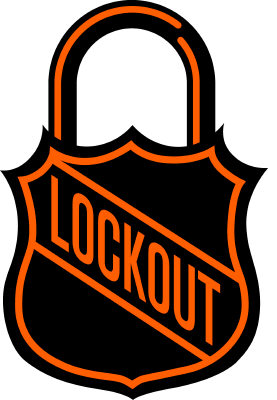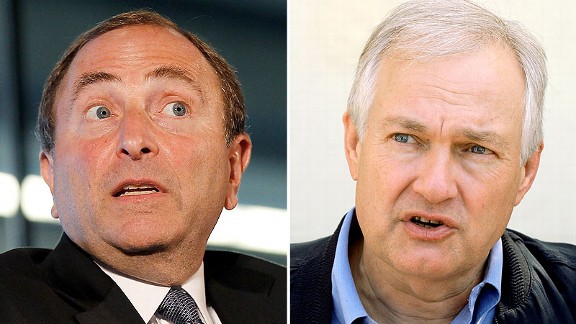
Here is what the league proposed for changes
| New 2013 Proposal |
2005-2012 CBA Agreement |
| Players portion of revenues is 46% |
Players portion of revenues is 57% |
| Players must play 10 seasons before earning Unrestricted Free Agency Status (UFA) |
Players must play 7 seasons or reach the age of 27 to before earning Unrestricted Free Agency Status (UFA) |
| New contracts signed by players are limited to 5 years in length |
No limit on contract length, although amendments to deter salary cap circumvention and over 35 rule |
| The elimination of Salary Arbitration |
If a Restricted Free Agent (RFA) is not happy with money offered to them, they may file for 3rd party arbitrator to determine contract value |
| Entry level contracts for players coming into the NHL will be for a length of 5 years with a cap |
Entry level contracts for players coming into the NHL will be for a length of 3 years with a cap |
It was not a shock in the least that the NHL wants to lower the players’ portion of profit sharing from 57% to 46%. Revenue sharing has been a red button in both the NBA and NFL recent CBA discussions, both of which were able to fight off a lockout. Even though the NBA had to go to a shortened season they were still able to get the CBA off the ground. 50% seems to be the going rate and that is probably what the NHL is shooting for. However you need to come on strong when negotiating and you don’t want to concede everything up front.
One interesting note to think about is something that Larry Brooks of the New York Post (@NYP_Brooksie) blogged about. His source states that not only will their be a drop of players percentage proposed, but also how the profits are grouped into a shared profit or an owner profit. The new layout may mean that players take closer to a 22% drop in revenues. With the NHL posting a record $3.2 Bil in revenue in 2012, you would have to think that greedy players ballooning salaries are making teams less solvent. That must mean small market teams are getting bullied and can’t afford high-end free agents, right? Well the owners lost that argument when the Minnesota Wild reeled in Zach Parise and Ryan Suter to matching 13-year $98 Mil contracts. Oddly it was only April that Minnesota Wild owner Craig Leipold was complaining that his team was not making a profit and players’ high salaries are to blame. So it would seem that it’s not the players, but the owners themselves to blame for overpayment and inflated salaries, and in turn they expect to have the players pay for it out of their revenue sharing.
 Meanwhile Commissioner Gary Bettman’s salary has doubled from $3.7 mil to $7.5 mil since the lockout. That salary would make him the 18th highest paid player in the league by cap hit, coming in just $300K less than the ridiculous contracts just signed by Ryan Suter and Zach Parise.
Meanwhile Commissioner Gary Bettman’s salary has doubled from $3.7 mil to $7.5 mil since the lockout. That salary would make him the 18th highest paid player in the league by cap hit, coming in just $300K less than the ridiculous contracts just signed by Ryan Suter and Zach Parise.The second change is that they want players to play in the league for 10 seasons before they can reach unrestricted free agent status. This would be at the very least 3 seasons longer than the current rules. Also there is no age limit, whereas currently if you are turning 27, regardless of the amount of the seasons you have played, you are eligible to be a UFA as soon as your contract expires. I understand that this is to try and save from huge contracts like those that were just signed by Suter and Parise. It’s not just this rule on its own that scares me, it’s this rule along with the other three rules that have been imposed. Together they create a very scary cocktail that implies that teams own players rather than have them under contract. Keep the 10 years in mind as we move forward.
New contracts signed have a maximum length of 5 years. It is also believed that the player must receive the same amount of salary in each of the years of the contract. On top of that there are no signing bonuses allowed. These rules on new contracts I am fine with to an extent. They are the result of teams doing whatever they can to circumvent the cap hit of players. Just about every big contract signed in the last 4 years has been front-loaded and it needs to stop. It got so bad that the New Jersey Devils were penalized a first round draft pick for their contract with Ilya Kovalchuck. This will create a slightly different NHL as we are going to see veterans move around more towards the end of their career, much like what we are seeing of Jaromir Jagr.
The elimination of salary arbitration is where I really start to worry. Currently when a player is a Restricted Free Agent (RFA), and they feel the offer from their team isn’t where it should be, an arbitrator will decide on what he should be paid. Shea Weber would be the highest profile arbitration case of the last few years. Without this arbitration we could see some battles between players and teams, however we may just see more offer sheets from opposing teams to acquire these RFA’s. Offer sheets can be a nasty affair like that of Dustin Penner from the Oilers a few years ago. However if they become common practice, it will be up to the team of the RFA to offer a just contract, and the offer sheets could in turn replace arbitration as the way salaries are policed. The problem is you rarely see offer sheets for anything past top 6 forwards or top 4 d-men, but again that as well would probably change.
Entry level contracts extending from 3 to 5 years is a bit absurd. Players would make at most $900K for the first 5 full seasons of their career. To put that into perspective, Sidney Crosby would have had four 100 point seasons (the other still scoring about 1.2 points per game), won an Art Ross trophy, Hart Memorial trophy, Lester B. Pearson trophy, Maurice “Rocket Richard trophy, Mark Messier Leadership trophy, a Stanley Cup, youngest captain in the NHL, youngest captain to win a Stanley Cup, and still make less than Mike Knuble. Not only is that a little bit absurd to think about, but with the growing strength of the KHL and the money they are throwing around, we don’t want to give young stars more motivation to play over seas. This rule would immediately deter the already rapidly diminishing Russian population from planning on joining the NHL. I would be surprised if down the road we would see top level North American talent giving a good hard look as well.
Lets put this all together, a player is drafted by a team. He is a great talent and signs a 5 year deal. He sits in that locker room full of 30 year olds driving Maserati’s and aren’t half the player he is. Finally after 5 years he has had a decent career but being on a small market defensive minded team he hasn’t put up the numbers he could on a better team. Also they are sitting on too many pre-2013 contracts that have them close to cap. He still has 5 more years before he can be a UFA, and with no arbitration, his team could low ball him with a 5 year contract. As an RFA he isn’t allowed to talk to other teams, and it is up to them to solicit an offer sheet to acquire him, or for someone to trade for his rights. The teams essentially own these players and have too much power over them. If he holds out he is deemed to be a bad apple or poison in the room, and all of a sudden he isn’t wanted around the league.
On the flip side, if superstars like Sidney Crosby dominate the league for 5 years, they are going to need to be paid, and paid big. No more of this $7.5mil cap hit followed by his new $8.3mil cap hit. After 5 years of $900k, Crosby would have wanted about $10-14mil, especially since it’s only for 5 years, and the state of concussions in the NHL. So in the end, we could be looking at a new, yet tell tale problem. Superstars getting paid big bucks, and everyone else being left behind.
Of course I don’t think that all of these rule changes are going to happen. The NHL will have to slide on a few of them. It is just a starting point, and this thing is far from over. Damien Cox of the Toronto Star (@DamoSpin), who I hate with a passion, tweeted “Folks, as I’ve said for some time now, pay absolutely no attention to the NHL-NHLPA stuff until November 1st.” Although he is a self-promoting dick who reports only on the negativity that surrounds hockey and would rather see a lockout than a season so he could write about it, he does have a point. Both sides will go back and forth until a reasonable agreement can be reached. Sometimes it’s just too hard to ignore news, now that we get it faster than ever before. Then again the NHL did stick to their guns in 04-05. If the NHL doesn’t budge, we could see a very long lockout. And now that the NHL has competition overseas with the KHL, a lockout could be detrimental to its prolonged success of being the worlds top hockey league.
Questions, comments, concerns on my views, UFA’s, RFA’s, Offer Sheets, Contracts, Arbitration, KHL, ANYTHING? Feel free to join NotInHallOfFame.com and post on the message board or find us on Twitter
@NHLKiDD
@NotInHallOfFame


Comments powered by CComment